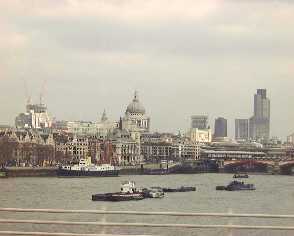
Executive Fellows - Class of 2001
Day 8 March 10th 2000
What happened on day 8
The final day of meetings began with a trip to
The Confederation of British Industries. The day also included visits with the European Union and finished with a meeting with the Bank of EnglandBack on the bus (or coach as the Brit’s refer to them) but our trip today is short.
First stop Federation of British Industry. Mr. Gary Kempkin, Head of International Division of the World Trade Organization (WTO) spent about 45 minutes with us. The WTO’s main office is in London, and another office is located in Brussels.
Their primary responsibility is to look after international trade investments. The UK is the fifth largest exporter of goods and the second largest exporter of commercial services. One quarter of GDP is exports – employment is obviously linked to exporting goods and services.
Kempkin spoke to, as did our other corporate hosts, globalization. He described free trade as an opportunity to bring together the big traders and said we need more flexibility in major players (other countries such as China and Russia). Russia is not a WTO member and Kempkin looks forward to the elections which he believes will reveal where Russia is headed.
Globalization is a reality but there is an element of debate regarding exclusion of developing countries. The U.S. is ambivalent about China entering the WTO as is would be possible that 10,000 farmers would be displaced. Many countries need to be educated on how to use the WTO and the benefits of being part of a democracy.
Regarding the Euro… it will be in Britian’s best interest to join the Euro when the time is right – will not be in the immediate future (the Brit’s don’t want it to be an issue in their election). Europe is extremely political and people are split on transitioning to the Euro.
Mr. Kempkin chose his words carefully. There was a general consensus that he has a very high profile position (he referenced his U.S. meetings on "the Hill") and he demonstrated a Parliamentary style presentation.
Next was our trip to the European Union. The European Commission (EC) consists of heads of government and heads of state from 15 countries. They employ 16,000 people engaged in legislation and negotiation on behalf of the countries represented. The European Institutions include the European Central Bank, European Court of Auditors, European Investment Bank (responsible for the Euro), and a variety of agencies (patents, medicine, agriculture, health and safety).
The European Commission develops policies on agriculture, fisheries, trade transportation, energy, indirect taxes, social policy and humanitarian aid. The council of ministries has the final say on EU law for 15 member countries. There are currently 13 applications on file for EU membership. Membership has symbolic importance, provides security, and offers economic opportunities.
Third stop was the Bank of England. This beautiful building is located on the financial side of downtown London. From the street level observers noted there are no windows. The building is designed for maximum protection and therefore the windows begin on the second floor. Inside we were greeted by two guards who explained that picture taking is not allowed. Unfortunately we were not able to capture the interesting displays in their museum of history.
We met with Nick Stansfield, Manager of Education. Mr. Stansfield indicated that the Bank has changed more in the last five years than it has in the last 300 years. It is London’s largest central bank. Changes in the economy and technology have demanded that the Bank keep up with the times. The Bank’s number one priority is to maintain monetary stability and financial stability.
A short video was shown titled "Stay Ahead of the Game". The video described how interest rates control inflation and how members of the Monetary Policy Committee can decide to change interest rates. The Bank of England’s philosophy is that it is good to have an independent view of interest rates. Banks acting in concert with government equals financial stability.
The Bank’s responsibility is to ensure international dimension of banking with other central banks. Bank supervision has disappeared. It is now called Financial Services Administration whose purpose is to focus on monetary policy. We took the opportunity to ask Mr. Stansfield, as we did almost every other place we visited, his opinion about the Euro. He indicated that the Euro will make trading more equal and risk-free. He reiterated that the bank cannot be complacent and the Bank will be prepared to act as directed.
Day 5 ended with a trip back to the hotel in the middle of rush hour traffic. 8,000 people live in the city and 400,000 commute into the city daily. Granted a majority of the commuters use the tube, but a number choose to drive (some very nice cars) making a drive on Kansas City’s Grandview Triangle look like a Sunday afternoon cruise.
♪♪♪♪
……together in perfect harmony. ♪♪♪♪HOME | Day 1-2-3-4-5-6-7-8-9-10 | Co's Visited | Cities Visited | Fun Stuff